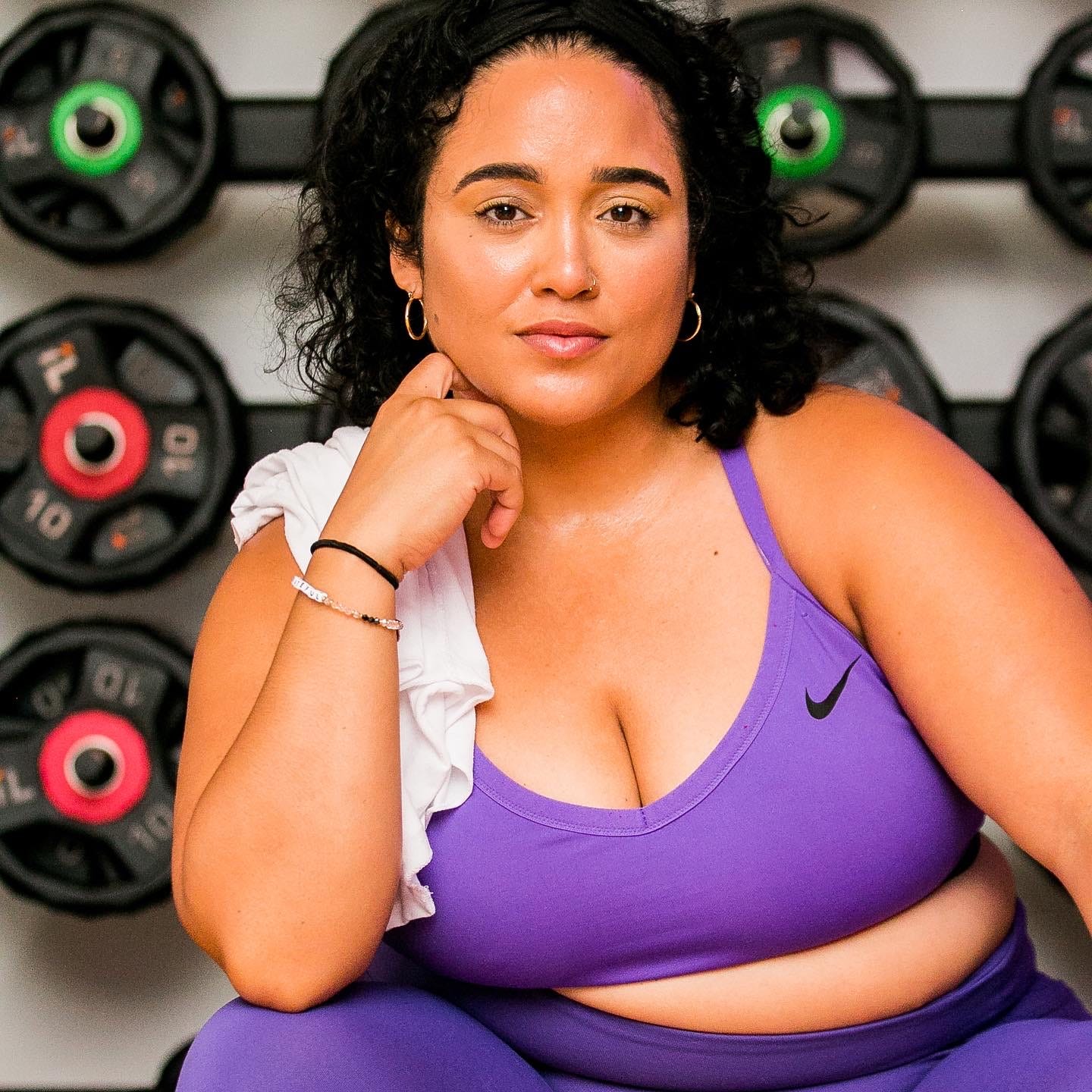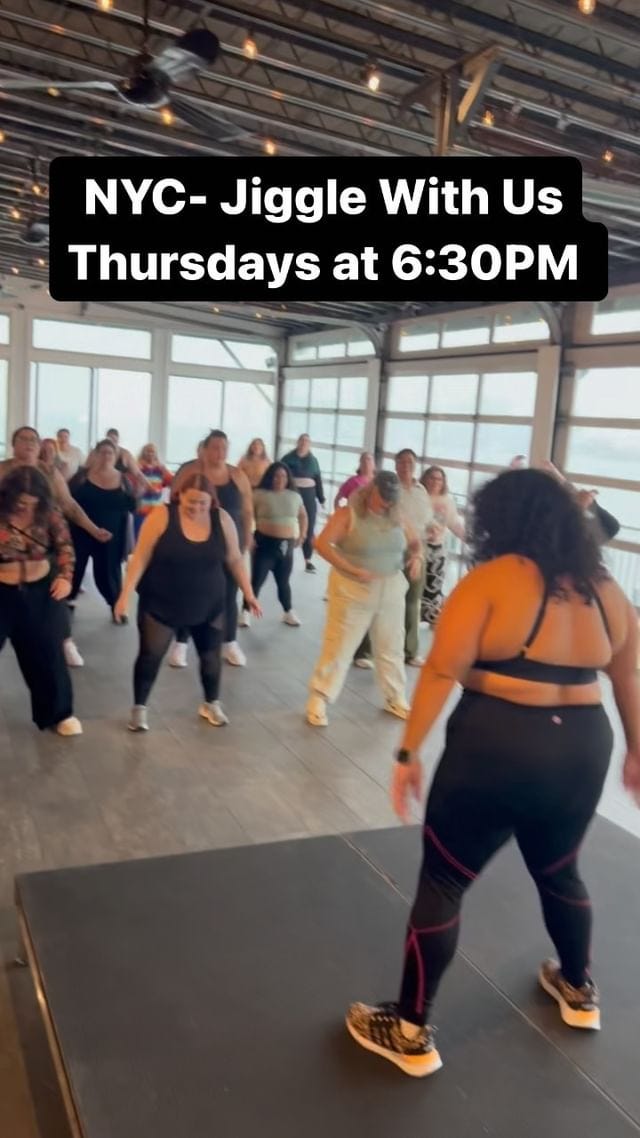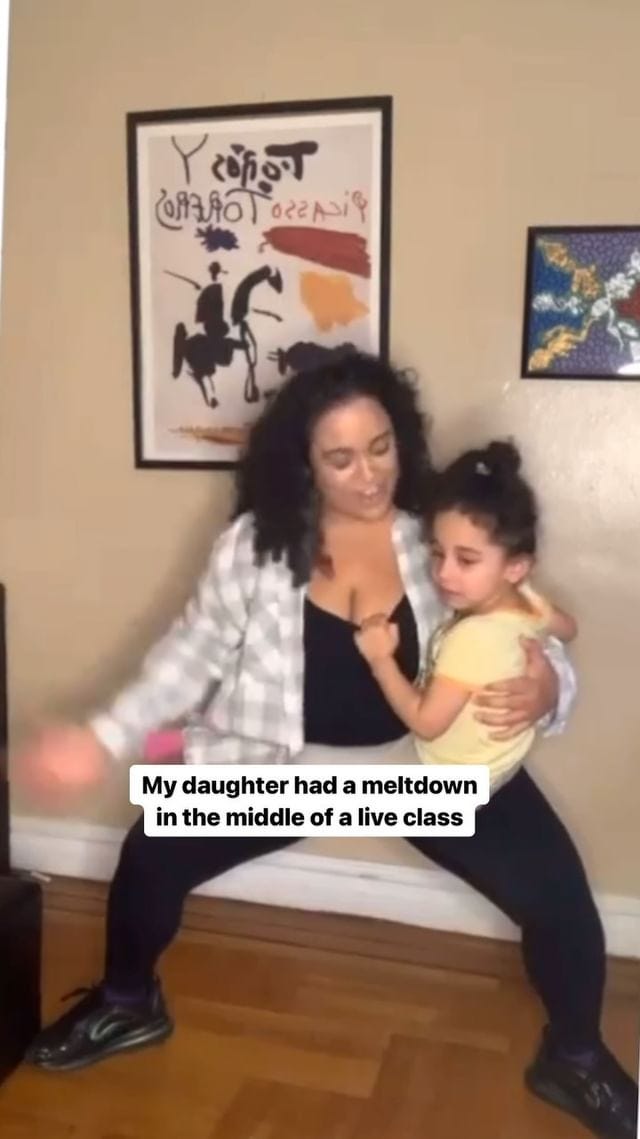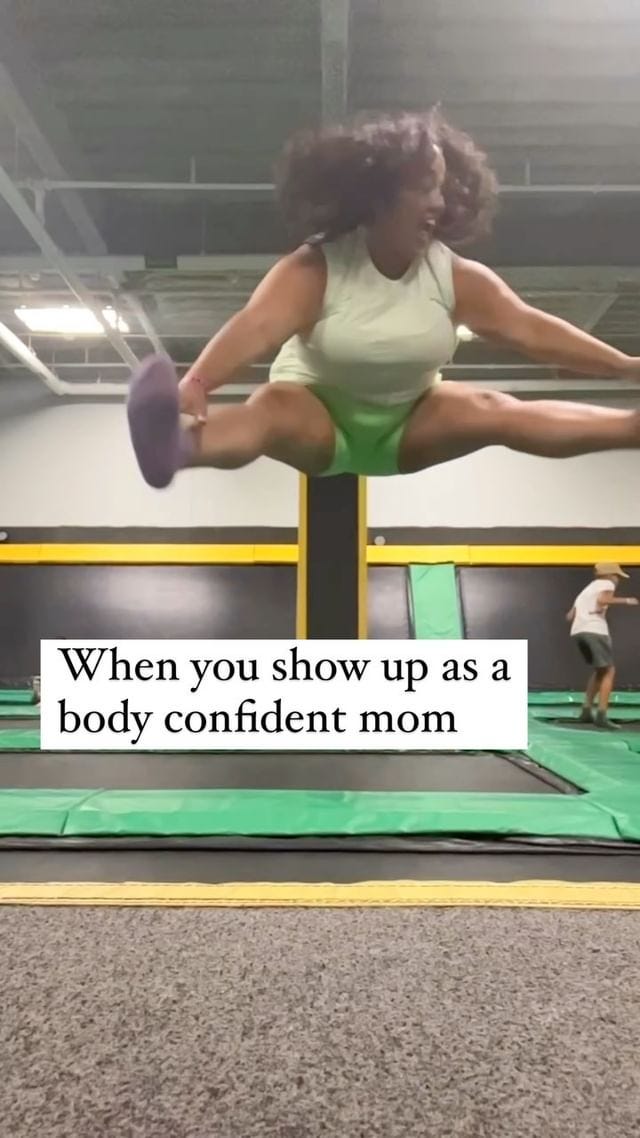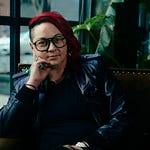You’re listening to Burnt Toast! This is the podcast about anti-fat bias, diet culture, parenting and health. I’m Virginia Sole Smith.
Today I am chatting with Jessie Diaz-Herrera. Jessie is a body affirming dancer, health and wellness influencer, and fitness enthusiast. You might know her on Instagram as @curveswithmoves, or from her Free the Jiggle classes.
The first half of this episode is for everyone, and then paid subscribers will get to hear Jessie answering your listener questions about size-inclusive fitness. We’re going to talk about:
How to take our focus off how we look and onto how our bodies feel during exercise.
How to feel safe and supported at the gym in a fat body.
How to find time to exercise in the first place, especially for exhausted new parents.
Here’s how to join us to hear the whole (amazing!) conversation!
If you’re enjoying the podcast, make sure you’re following us (it’s free!) in your podcast player! We’re on Apple Podcasts, Spotify, Stitcher, and Pocket Casts! And while you’re there, please leave us a rating or review. (We like 5 stars!)
Episode 121 Transcript
Jessie
So I am a body affirming fitness instructor. I own Power Plus Wellness, where we curate fitness and wellness events for plus-sized bodies to practice wellness in safe spaces. My work revolves around movement and what that looks like outside of diet culture.
Virginia
You were a dancer as a kid, but you stopped around age 12. It took a while for you to get back to it, to rediscover the passion.
Jessie
As a kid, I was very active. I had ADHD as a kid and still do now. At the time, my parents were just like, “We need to tire this girl out.” So I was in a myriad of programs and I’m very grateful to my family, to my parents, for putting me in a bunch of different things. Dance was one of the things that I felt the most focused in and also the program I wanted to go to the most. I couldn’t wait to go to dance classes on Saturdays. I was a ballet, tap, and jazz girly from four years old until we hit the teen programs. And I was committed to the studio in Brooklyn for my whole childhood basically, I grew up in the studio. And it was in the 90s, so prime diet culture, very skinny era. And also I’m in the world of ballet.
Virginia
Double whammy, triple whammy.
Jessie
So like, put all of that together. And I remember, we had to audition to the ballet academy. It was this certificate that you got and it was this huge honor to get into the program, especially as kids who grew up in ballet, tap, and jazz. You’re looking forward to like, Oh, I’m going to graduate to this next phase in in this program and in my life as a dancer.
Puberty hit for me pretty early on, I think I was 9 or 10. I just started developing a lot faster than the other girls in my program. So I remember practicing really hard for this program and for the certificate from the Ballet Academy of Dance. I did the audition, I felt great. And afterwards one of the instructors told me, “You were really great.” And I got in, but they advised me to lose weight. I can’t remember the way they said it.
You have to remember how much I looked up to these people. These were my instructors that I wanted to impress and I wanted to do well. Also just thinking about being a kid in that era, like, what does dieting even look like? What is that? You know, there’s no advice out there.
Virginia
Right, what were they asking you to do?
Jessie
It was just like, “You need to lose10 pounds,” or whatever. The head ballerina in our program, she was very skinny. She was a beautiful Russian teenager. I just was like, “Why don’t I look like that? I don’t understand. My body doesn’t fit the program anymore.” I started to feel shame. I didn’t tell my mom that they told me to lose weight, because I knew that was wrong. But also because I was motivated to do it and I know that my mom would just be upset about it.
I just sort of started skipping meals. Like, I’m not hungry, I don’t feel well. And my mom was like, you don’t have a fever. Like, what’s wrong? So I consistently started skipping meals and eventually I fainted. My mom was super pissed. “What is going on? Tell me what it is.” And I told her they had told me to lose weight and I was just trying to lose 10 more pounds.
My mom is ’s one of the people that you don’t mess with her daughters. She’s Nuyorican, she is just a spicy New York Latina. So she stormed off into the studio. Nobody tells my daughter, what to do, how to how to eat. And she cursed everybody out. I was so mortified. At the time, I was mortified. I was like, “My mom ruined my life. She ruined my chances with the program.” I didn’t know that she was defending me at a time that I couldn’t. So yeah, I kind of left dance for a while after my mom pulled me out of the program.
Virginia
She was like, “We are not doing this.”
Jessie
Rightfully so, but I was devastated because that was what I loved to do. But I was also in sports at the time, and so I dedicated my life to sports after that. I played softball, I played basketball, if there was another sport, even like a recreational sport, I was playing. Anything that I could do to keep active because I knew that when my body was active, my brain wasn’t going crazy and I wasn’t stressing out. I even knew that as a kid, I just wanted to always move. I needed to expel this energy.
But it wasn’t until college really, that I started dancing again. And there was a big change from being ballet, tap, and jazz in the 90s and then going into college in the 2000s into the hip hop kind of time where it was just more acceptable to have a different body. They were seeing dancers of every color. In that way, college felt a little bit more acceptable.
But even then, there were times where everyone had to wear this costume and they would send you the link to buy your costume and of course it only went up to a large. But because I felt so guilty, I would never tell the instructor. I actually found—I was trying to think about her name the other day, bless her heart—I found someone in Idaho who was actually making me custom outfits.
Virginia
Oh, wow.
Jessie
For every single show I had! I think of how ridiculous that is now, but at that time I would be so mortified to tell them that they would have to change their costume because it doesn’t come in my size.
Virginia
But they should have. That shouldn’t have been your burden to have to find a custom costume lady.
Jessie
Yeah. It’s funny, we think about how we consider ourselves big. I think I was maybe a size 12/14. So it was an interesting time. But I know that when I danced, everyone was like, “Man, you’re so good at dancing. You’re so great, this energy, this personality.” I started just to gain more confidence in myself. So something that I felt like was stripped away from from my body actually, in a way, gave me confidence later on.
Virginia
I have to say, big props to your mom. It was definitely the right move but also such a hard call, right? Of course she knew she was breaking your heart, but also keeping you safe. That is such an impossible position to be put in as a parent. But I think it’s a great takeaway for parents. You might have to make a tough call. And it’s helpful to hear that even if my kid doesn’t do this program this year, and it feels like a big missed opportunity, it doesn’t mean the door to dance is closed forever for this kid.
Jessie
I will say, I recently took a ballet class for the first time since that had happened, like maybe two months ago. It was with a fat instructor, it was someone that I felt comfortable. We actually were testing them for one of our newest classes for Power Plus Wellness. But I remember being in the class and feeling anxiety, and I was like, oh my god, like, I really want this feeling to go away. And eventually it did. I mean, it may not be ballet for me anymore, but it may be something else.
Virginia
I was just thinking: Maybe it’s not ballet for anyone, you know? Should we be reclaiming and remaking this institution into something that’s inclusive and welcoming for everyone or should we be saying ballet, your track record is pretty bad. At what point do you decide it cant be reclaimed? It’s not my call to make. I’m not a dancer.
Jessie
Totally. Yeah, I will say probably that would be like — we’ve made it.
Virginia
If we have fully body inclusive ballet.
Jessie
Totally. I think it is probably the most restrictive in my head.
Virginia
It really is.
So once you started designing your own dance classes and moving more into the fitness space, both these worlds are so laden with diet culture, how did you navigate through it?
Jessie
Because of diet culture, I had to create my own lane after college. I was in social dance clubs. Even though I was a great choreographer, in those situations they wouldn’t let me be a choreographer. People wouldn’t understand, like, “Man, you’re so good at dancing, why is it that she’s not putting you in this space?” And I’m like, it is what it is.
I realized that I was always following by other people’s rules, about what they wanted to see for their company or what they wanted to see for their vision of what it looked like on stage. I just was limiting myself because I was putting myself in these positions where people were telling me what I can and can’t do when it comes to dance. At the time I was in my 20s already and I was like, I don’t have to really confine to that.
So I was actually working with a bunch of different choreographers, just taking classes weekly just to perfect my craft. And I got really close with an instructor—shout out to Rick. He knew I was a great dancer and he knew that I taught and so he was like, “You know all my routines whenever I’m out, would you mind covering the class? Like, everyone knows you and you’re such a great, energetic person.” And I was like, oh my God, yes. So I would sub for him every now and then he gave me my first break to start teaching classes in New York, outside of a social dance club.
That felt really, really great to have someone who saw my work ethic who saw my commitment and knew that I could do this, regardless of my body. You know, not only am I plus size, but I’m short. And the idea of a dancer is long and graceful and I just wasn’t fitting that criteria of what we normally think of as a dancer.
It was just really nice to have those opportunities and I think that’s what really led me to start creating classes myself. So in the 2010s, we started what we then called body positive dance classes. That was at the time where body positivity was really claimed by the plus size community before it was more universal, I want to say? And it was actually a two hour workshop. We held these once a month, it wasn’t something that I did regularly every week. But it was a lot of intention behind it.
A lot of the time, when I was dancing, I would realize I’m the only plus size and sometimes the only person of color in the room. I was like I know there are other dancers out there like me. I know that I’m not an anomaly. I danced with other people in college, where are they?
So I started posting on social media and creating these classes. I really wanted to create intention behind it. I realized people were saying to me online, “I wish I could go to class, but I don’t have the courage.” A lot of it was like, finding the confidence just to get to the class.
So I was saying, “Hey, I look like you. I am also in this space where I know it can be scary. Come and let’s be scared together.”
So the first half hour, we didn’t dance. We talked. We gave out affirmation cards. Sometimes we would talk about like, hey, does that resonate with you? Why? We’ve had vision boards. We’ve had stuff where we did some cord cutting, where we wrote notes about things that we didn’t want to take with us in the New Year and burned them. There’s just so many things that we really did that felt like we had a close knit community before we started to move. We also got silly, and I think that’s what people are afraid of—sometimes they’re afraid to look silly. But when we’re all purposely being silly, It just takes away that barrier of like, "Ph, I don’t want to look silly.” It’s, “Oh, wait, we’re supposed to be silly here.”
Virginia
You were making a safe space for people to show up in their bodies.
Jessie
This was after I had my daughter and my body changed. Because tour body just changes immensely once you have a kid. I think some people don’t realize this, but it’s not about the weight or anything, it’s more just like even the shape. Just like looking at your body saying this is not the body I’m normally seeing in the mirror. So now I have to adjust myself to what I’m now seeing. I think all of that kind of plays a role.
Virginia
I’m glad you brought up your daughter because I wanted to talk about her a little bit. We both have daughters named Violet.
Jessie
Oh my God, I love that.
Virginia
I love how you talk about modeling fitness for yourself and how you’re modeling it for her. It feels really different from the diet culture version of “mom fitness” that we are sold so often.
Jessie
It will say again, I think it’s the silliness factor. I’m not afraid to be silly. And I think sometimes as parents, we sometimes we lose that silliness a little bit. But especially with our kids, we can be silly! With our kids there’s a comfort in being silly. I know that especially with my daughter, she loves to be active. And I always wanted to make sure that she felt comfortable doing whatever activity that that it is for her. But also that mom can participate if she wants to.
For me, fitness is really all about the functional, like what I want to do as a parent, what I want to do in my life. I want to have more endurance to keep up with my kid. She likes to be carried a lot still—my daughter is on the spectrum and really loves being held. And she’s just going to be tall, like her dad. She’s almost 8 and four feet, and I’m five feet.
Virginia
You need to be strong.
Jessie
I want to be able to hold my kid if she wants to be held. After becoming a mom I think just my shift of fitness changed into what I want to continue to keep doing and how I want to move through life with her with with my with my future kids. Even just talking about bodies in general. It’s so interesting because my daughter is obsessed with my boobs!
Virginia
Kids are so helpful that way!
Jessie
They are so funny, right? She’s like, “They’re so wiggly.” My daughter is saying, like, I love how wiggly they are. It’s playful, and it’s fun and I like to touch it. It makes me happy. It makes me giggle. Like, she’s laughing. It brings her joy. So, you know, you start to look at it differently.
And not just with bodies, but just with movement in general, we just want to look at things a little bit differently.
Virginia
So you posted a reel recently of you at a trampoline place with your daughter. My kids love trampolines. I don’t love them. What I really don’t love, honestly—I actually like trampolines. I don’t love the trampoline place, which is like a sensory nightmare to me.
Jessie
Yeah, it’s chaotic.
Virginia
All the kids and then the ball pit and I’m like, “Someone’s gonna get pinkeye.” The whole thing is just is not my jam. And their dad is the fun dad who will take them to the trampoline place. But my older daughter has been saying to me lately, “I want you to come to the trampoline place. Why don’t you go with us?” And I’m like, “Damn it, I’ve got to do it, right?” I don’t want her to think only her skinny dad who’s a big runner guy—he’s very traditionally fit—I don’t want her to think that that’s the only type of body that goes to the trampoline place.
Jessie
Look, I’m one of the only moms that is jumping out there, regardless of body. Two things I will say: 1. Find out the times where there are not a lot of kids around because I rarely go when it’s the busiest. And 2. I think is overstimulating for both of us. And sometimes I’m like, “There are a lot of kids there, I don’t think I need to jump. I think you’re good.”
But I think it forces us to—when there are not that many kids—kind of play around with her, too. I tend to jump for a couple minutes, but I’m very much just on there kind of bouncing a little bit. I’m like, “What cool tricks can you do? I’m timing you for races!” There are all these lazy mom ways to get your kids active and you can stay still. We’re playing all kinds of games.
Virginia
Okay, I’m going to work on it. I do think there’s real value in that. And I also want to be mindful that not everybody has the physical ability to do these things and it doesn’t make you any less of a mom or a person, of course.
But I am a mom who gets in the pool and who wears the swimsuit, and isn’t afraid to play in the water with my kids. That was something I was very intentional about. And so when this came up, I was like, “Oh, am I doing that with the trampoline place?” So I’m on my trampoline journey.
Jessie
Take the journey.
Virginia
Another thing I would love to hear about, if you’re comfortable sharing, is I know you had a really big health experience recently. Would you be up for sharing that story and how that has further evolved your relationship with movement?
Jessie
I had a stroke in August of 2022, about a year and a half ago. We found out that I had a hole in my heart that I was born with, which was small enough not to create a murmur. So this blood clot apparently just transferred through this hole into my brain and it happened suddenly. It was very sudden. I had some signs of fatigue the month before—I actually went to the hospital twice because I was just feeling very lethargic. My blood pressure was pretty low. They were figuring that I was dehydrated, so they kept giving me IVs. Everyone thinks I’m young and I wasn’t showing signs of any neurological issues. And I just thought, “Yeah, maybe I am just dehydrated.”
I was also working insane amount of hours around that time. I realized later on, I was on the couch for maybe like 16 hours. Especially when I start to get hyper focused, I could be on the couch for five hours without a drink of water, getting up to use the bathroom, eating anything. I’ll get up feeling really dizzy. I’m like, “Man, I keep doing that to myself.” So I realized the way I was working, I was either sitting for like 16 hours at a time and then going the next day to teach two classes in a row. The balance wasn’t there and I was putting my body in these extreme situations where I was just either really sedentary or really, really active. My body was just like, whoa, what’s happening here.
So that’s what will cause a blood clot, because we haven’t found to this day any other blood clots. It was just a situational thing that had happened. And I say that because I was in the hospital for a week doing just a multitude of tests after the stroke, because we couldn’t figure out where this blood clot came from. or why it happened. When I went to my primary doctor, whom I love—I could go on a whole other rant, but make sure that you really have a medical team that is for you and about you. You have the right to do that. That is your call. But anyway, that’s another rant. It’s important to say, she was like, sometimes science just can’t find the answer.
Virginia
It’s so true. It’s so irritating
Jessie
Stress is such a high cause of sickness and situations. I was just putting myself in a stressful situation where my body was like, “Hey, we can’t work like this anymore,” and so I collapsed. Ironically, it was right after a couples therapy session on Zoom.
It was so crazy, because later my therapist said, “You seemed so fine.” And I know, I thought I was fine, too! And I go to charge my phone, and I’m on the floor and I have no idea why I’m on the floor. The only reason that I knew I was having a stroke is because I went on a YouTube spiral six months prior. There was a doctor who had had a stroke and studied her own brain. Dr. Jill Bolte Taylor, My Stroke of Insight is a great, great TED Talk. She talks about how she realized she was having a stroke and she was in and out of it. And so because I felt no sensation on my left side, I felt my face start to droop and I was like, “I have to call 911 immediately.”
I was actually home alone. Luckily, my daughter was in Dominican Republic. We were supposed to meet her four days later. She was there with her cousins, spending time with her aunt and her grandparents, and we were supposed to meet them.
So, luckily she wasn’t home, but my husband was out. And I had collapsed and I had called him. And he was like, “What is happening”? And I was trying to tell him what’s happening. But I was starting to, like, get flustered because I couldn’t talk. I remember I called 911 to try to give them my address. And in my head, I was saying the right numbers, but the wrong numbers were coming out. And I was just like, this is insane. Like, I’m getting upset at myself. I could see the number and it was just, it was it was super interesting to know that I was experiencing this but couldn’t do anything to try to fix my speech or try to get up.
Luckily, the ambulance came within maybe 10 minutes. But I didn’t want them to break down my door because because like safety things, right? My door is right in front of the elevator. I’m like, “Ff they break down my door, like it’s going to be open.”
Virginia
Someone’s going to have to fix that at some point. How’s that gonna happen?
Jessie
But I love that as I’m having a stroke…
Virginia
I would be doing the same thing, though. Like, “This is going to be a hassle I don’t want.”
Jessie
Even though I’m on the verge of death, I don’t want them to break my house. I have to laugh at myself. So I’m on the floor and I’m just pulling myself and pushing myself on my body to go to my front door—I was in my bedroom. So that was rough. But luckily I was in the hospital within 45 minutes of everything happening. And because I got the medicine so quickly was able to reverse a high percentage of my movement, my speech.
So that was just a godsend really, just to know that I was okay. Because it all happened so fast. And you know, I was in the hospital for so long, and I was starting to feel better, I could move, My speech was coming back. I felt really in high spirits. And I was really grateful because apparently, I had a major stroke.
I don’t know what kind of sign this was for my life, but I knew that movement wasn’t taken away from me. And so I think for me, that’s something worth celebrating and something to continue working on. Because that’s my career. My career is moving.
I took that as I took that as a huge sign to just figure out life balance. That’s really when I started to think of movement more functionally, especially after having a brain injury, right? It’s like, most of my strength is gone, I want to rebuild my strength, rebuild my core, I want to get rid of some of these headaches, using breath work, and all of these different kinds of things that we don’t tap into enough.
If I only thought working out was to lose weight, then what do I want to work out for? I don’t want to be part of that culture.
We see that movement increases dopamine, increases serotonin, all these happy hormones, and all these things that are stress relievers. In that same vein, even for mental health, for brain health, I knew that I had to continue moving in a way that felt good for me.
Virginia
I so appreciate you sharing that story. I know that’s obviously a super harrowing experience you’ve been through and I just want to hold space for you sharing that and reflecting on it in such a thoughtful way for us because I think that’s helpful.
Bodies do really tell us what’s good. I have a lower back that will let me know when I am pushing it too hard. It’s like, you pushed it too far. You didn’t take care of yourself.
Of course, we all don’t have the same resources or bandwidth or access to these things. And that’s a huge part of the conversation, too. But it does sound like shifting your lens from a diet culture definition of fitness to more just what you want it to be is a really powerful tool.
Jessie
I think movement has been tied into diet culture for so long because we because it was always how do you lose weight? Diet and exercise, diet and exercise, diet and exercise. But exercise is not part of dieting. You know what I mean? Just because it got lumped into it and we now associate it or it can have a triggering association with fitness and diet culture.
My goal is to encourage, especially those of us in plus-sized bodies, to reclaim exercise from diet culture. I really want to reclaim what movement looks like for us and and just personally what it can look like for you because regardless of your shape or your body size, fitness is personal. It’s super personal for you.
Virginia
Well to that end, I’ve got a bunch of listener questions I want us to run through, because you have a ton of fans in the Burnt Toast community. And these are all really about how do we untangle movement and fitness from diet culture because that is such a project for all of us.
The first question is:
Do you have any tips for focusing on how you’re feeling in your body versus imagining how your body could look? This feels especially hard with dance.



